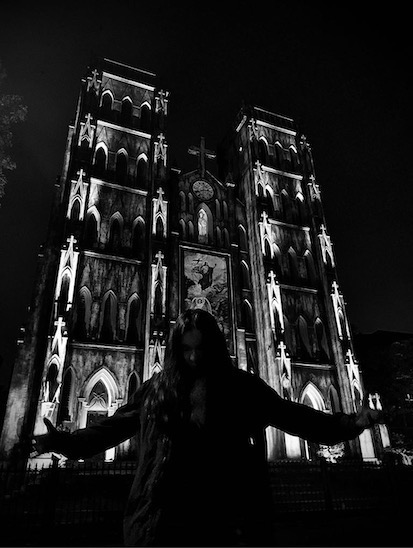
Downfall, Dødssanger
(In an effort to help shine a light on metal from Vietnam, our Hanoi-based correspondent Vizzah Harri has brought us the following very erudite and very entertaining interview of Downfall, the person behind the Hanoi-based black metal band Dødssanger.)
Dødssanger is Downfall, writer, multi-instru-mentalist and creator of the depressive black metal project that released their debut last year.
I met with Downfall at the end of February this year but the day job, time-fvckery and taking on too many projects at one time meant that the finishing touches were pushed back. Islander posted my ‘6-word novel’ review of their song Penance in this reader’s most infectious lists of 2023 which can be found here. If you didn’t get the time to read those posts, here is what I said about Penance:
“Hebephrenic grimoire,
hellatious hymnals of ill-grace.”
Those words still stand.
The interview that follows lighted upon musings about live performances, the Vietnamese music scene, as well as their recording process. Dødssanger just released their album in physical format and it can be found/ordered here: and there are only 21 copies left of an original 40.
VH: Hi Downfall, thanks for agreeing to this interview!
Downfall: Hi Vizzah, thank you so much for providing me with the opportunity to give insight (however much or little) on these topics being brought up.
Reflection of a Wretched Soul is the 9th album recorded by House of Ygra. Does the number 9 have any special significance in Vietnamese culture or for you as an artist?
The number 9, or IX – should one follow the Roman numeral system, contains meanings of prosperity, longevity, and growth: this interpretation is consistent among Oriental, namely East Asian, cultures such as Vietnamese, Chinese, Korean, as well as Japanese.
Though I must add, that I feel a sense of serendipity in the connotation of the number – regarding Tarot divination: in the Major Arcana, the 9th card is The Hermit – a card of solitary introspection; while in the Minor Arcana (the suits of Swords, Chalices, Pentacles, and Wands), the nines reflect elements of inner thoughts and accumulative reflection on past endeavors/journeys. Thus, serendipity.
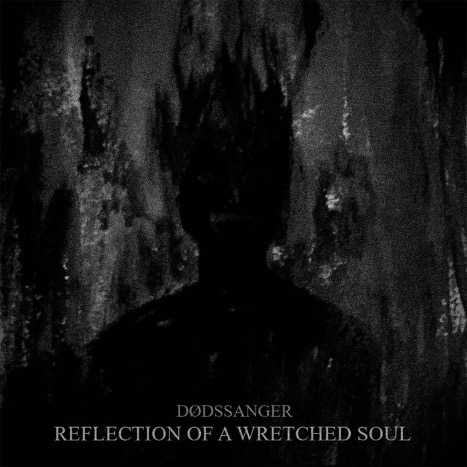
Loving the insight and introspection! Your album, Reflection of a Wretched Soul, kicks off, or should we say enters slumber, with the opener ‘Long dream’; is that a transliteration of the Sino-Vietnamese archaisms, as ‘Long’ as a name is connected to the word rồng (dragon), so is it a draconic dream or just an extended one?
As for “Long dream”, I will say that the draconic allusion of the word “Long” was not part of my artistic vision for the track: it is simply about a maddening nightmare that seems to never end. Should one be versed with the world of Japanese comics, they will know that the opener of Reflection… is indeed an homage to the eponymous one-shot written by the revered horror mangaka, Junji Ito.

Images used from the Junji Ito Wiki and Amazon
The first lyrical vocal line from “Long dream” abrades “Is this a nightmare without end?” and it closes with “Forever trapped in this baneful dream,” which for me closes a circle and is elliptical in nature. Is that something you keep in mind when writing or does it just happen naturally at times, the recurrence of themes not just within individual songs but throughout a longer piece?
Au contraire of other more linear fashions a la tracks such as “…Garden…”, I wrote “Long dream” in a specific manner that all interpretations of how the theme is played out in it are valid: linear, cyclical, instantaneous, frozen in time, etc. The idea of assigning a specific temporal expounding to it would invalidate the fundamental sense of what it is: a baneful mishap within an oneiric realm – where all discernments of time-space can easily be rendered irrelevant and even insignificant.
The methodology ultimately varies in an organic way, depending on the narrative goal I have in mind for any piece.
Last year, and now 2024 being hot on its heels as far as new music is concerned; were/ are there any albums that really stood out for you of late?
I agree that 2023 was a year that the world was offered a bountiful catalogue of new releases (the comeback of DSBM veteran Austere [Edit: they released Another one on the 5th of April just past, happy{lol} days for DSBM fans], the macabre swan song of Urfaust, the cacophony from the Lovecraftian maestros at Sulphur Aeon, to name but a few), but unfortunately, I cannot say the same for this year. 2024 has hitherto been… rather sparse of new music that can be described as mind-blowingly good, only decent.
That is not to discredit the first quarter of this solar cycle, though: I have found a handful of albums that I would consider definitive for this year – “Prophecy” by the illusive dark-synth musician GosT, “Suffer & Become” by Vitriol, and – going against my previous words here – “Hollow” by the Hauntologist duo.
What kind of equipment did you revert to in the creation of the album?
I have always been adhering to a creative philosophy that emphasizes simplicity and minimalism. In regard to the making of Reflection…, I used two mics: one dynamic for my vocals, one condenser for my instruments; a Roland combo amp for bass, and a Behringer 2×12 combo amp for guitarwork.
Musically you opted for mid- to much slower paced riffage initially, which loops a lot; it’s a slow burner so to say and overall, it was a grower for me to start with; what did you listen to before and during recording and did you achieve what you set out towards as far as finding the sound/aesthetic you were looking for? Also, can you share a bit about where your mind was at, at the time of writing, and a bit about your method?
This can come off as being condescending to my past self, but I wrote Reflection… when my aural appetite was unabashedly plebeian – which is clearly reflected in the composition of the album. So, to answer your question, Xasthur, None, and Mgła; and I would say, in relation to myself at the time, that I had attained the creative goals that I set out for Reflection….
And concerning the place where my mind was at when I created the album, it should come as no surprise that the abyssal depth of misery is the name of said place. Oftentimes I would allow myself to be taken ahold by the creeping claws of sorrow and see what sort of artistic ideas would come up, then I would pick up something to materialize them to make sure that they would not fade into the abyss.
The title track picks up the pace into more mid-paced territory and the vox too amplify in intensity; by the time we get to ‘Penance’ – the track you chose as a single – the drums are really laid back while the verse riff cloaks the soundscapes exuded with what can be seen as epic raw black in ways. Yet there are lots of other skittering sounds hiding in the mix that are not perhaps that obvious on first listen. How much fun did you have with the recording, mixing and mastering process(es)?
Said intricacy is an acquired taste and craft that one can only get through a consistent and conscious process of accumulation and active production; once I have gotten the hang of it, I truly savor every moment that I get to sit down, bring my artistic vision to realization, and be meticulously intimate about it.
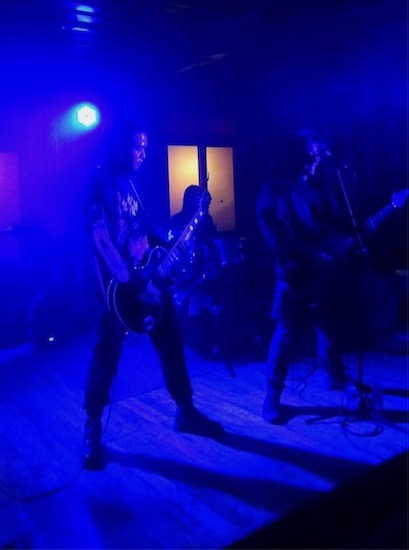
This might be the last piece Vizzah Harri produces for showing a DSBM artist having fun…
I was fortunate enough to experience you playing live at Hub/Gra studio last year, and I have to say this album was made for performing live. What are your thoughts on live venues in Hanoi and that show (for a depressive black metal band you seemed to have a lot of fun), and what are the biggest pitfalls bands in Hanoi face when it comes to recording and playing live?
I am not one to be overly critical when it comes to gauging the outcome of every show that I attend, especially those where I myself, among my friends and peers, am a part of the lineups; and for my performances, I tend to review them in a “what was good about it, and what can be improved upon” sort of manner, and make time for appropriate rectifying of possible flaws of past shows I had played plus sufficient preparation for future ones.
This connects to the second and third parts of your question, because I believe that the most fun playing live is simply every time me and my partners in crime kill it on stage and deliver a good show for the audience – a sort of talk that bands, especially novice ones, have always been struggling to walk thus far: hence, one of the pitfalls here is there would be instances where bands would, quite regrettably, learn the songs instead of rehearsing them at practice sessions, which inevitably causes the quality of their live performances to suffer, to varying degrees.
Recording-wise, I believe the shortcoming lies in a lack of refinement and conscientiousness in the process, and while I cannot make judgments on their work ethics (for quite obvious reasons), the quality of a certain work of art can speak great volumes about its creator.
About your live show at Hub/Gra: Other than Giang and Phong from Vong on guitars and drums, who filled in on the bass?
Regarding the session bassist, it was a fellow named Duc Anh, a friend from my days of hanging out with other artists in the student metal scene. I still am really grateful that he stepped in and helped us out when the time budget was working against us.
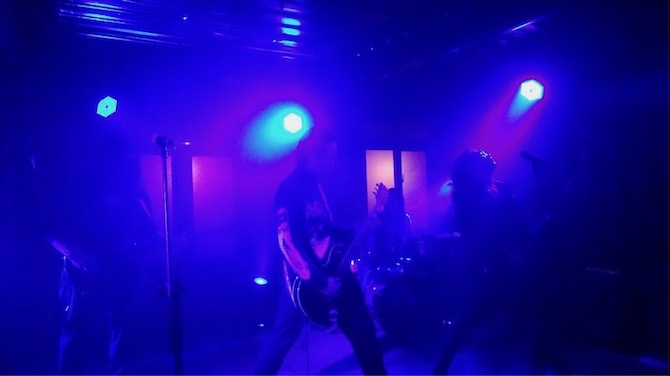
Dødssanger live @ Hub/Gra Studio 2023
This is a question for a longer piece for sure, perhaps even a novel/documentary, and it connects to the previous one; but what are your musings on the metal scene in Vietnam today, and Hanoi in particular?
It is hard to mask my elation when I enter discourse about the Hanoi metal scene specifically, because one can see that there is almost a kind of Renaissance that is happening in the metal culture of this city, and it is owed to a movement of burgeoning yet extant, conscientious musicians – artists, in general – who are committed to acting in good faith towards their art – and in effect have created a musical identity for metal in Hanoi, in a way that the label “Hanoi black metal” is now apt. This is somewhat in the same vein, albeit yet to reach such a level of acclaim, of “Gothenburg melodic death metal”, “Bay Area thrash metal”, “New York hardcore”, etc.
Bit of a curveball here… Who is/are the most punk metal musician(s) in Vietnam?
People tend to focus a little too much on the aesthetic aspects of punk and anarchism, insofar as conflating the mentality with the appearance of it, ultimately besmirching what those two ideologies stand for.
As for who is the most punk Vietnamese person/people to have graced the stage so far, I would like to leave the answer open – especially now when you are witnessing a young, up-and-coming group of Hanoi musicians under the name “Nuclear Stockpiles” (haha)
Asia is not an easy place for metal to grow, and as we know, metal as being a kind of protest music, it means that the more opposition/resistance something gets, it sometimes gets tempered, becomes stronger for it. I know about the fact that in Malaysia certain forms of metal are not as welcome and in Singapore even bands like Varathron were forced by the authorities to omit some songs off their playlist due to lyrics being deemed uncouth. There is an omniscient anti-verdurous-tinged white elephant in the room which influences, informs, philia-lizes and keeps the golden-age philosophy present by ensuring that what the background of the very symbol of the north stands for is never repeated:
How much does this omniscience impact you lyrically? Do you think it has a collateral and intentionally whiplashed effect of hobbling creative output and constructing an invisible yet palpable ceiling to the potential of metal’s most pure and protestant (lol) sub-umbrella?
I am speaking in extremes here: had I been into the making of politically-charged music that, in all honesty, has hitherto been absurdly reactionary a la bands better left unnamed, then it would indeed have been a very different story.
But alas, I am but a humble bard that sings about the suffering and sorrow that is universal for every being that has graced and/or disgraced this Earth!
It is liberating when one realizes that all foul manifestations such as war, greed, corruption – you name it – are all mere symptoms of a singular wickedness, with a history most long-stretching, that is the wickedness of being human. Hence, I directly address the natural, humanly woes and throes as they are, in a rather metaphysical manner; and that allows me to bypass all mundane anxieties of ruffling feathers of any possible concerned parties.
Woe is woe. Simple as that. You can coat your discourse about it with politics and war and whatnot but that only prevents you from direct contact with it in its most primal and true form.
Thanks for your answer, it’s hard to ask or answer without stepping on any toes, and so, on to less loaded fare for non-muzos like me: How did you get that guitar tone on the opening riff of ‘Garden of Suicide’? It sounds almost zither-ish…
The tone I used for the intro of “Garden” is quite easy to achieve: a clean tone with pronounced midrange and high-end, drenched in reverb, spiced with a little chorus and delay.
Having witnessed the Slam City Festival with three bands from Hanoi representing Vietnamese metal, it was both awesome and alarming to see that the scene in Phnom Penh is consanguineous in the sense of having a homogeneity of sorts where there was not one of the 7 bands that did not share a member with another act. This is not the case in such an extreme sense in Vietnam, but it seems to me that the metal community here is fairly tight-knit. How much does it help having such a core group of like-minded artists in the underground scene that push each other’s music and projects?
The concept of a tight-knit group wherein one group of people can be in multiple different projects is not new. In Hanoi it would be the guys from House of Ygra. In the Saigon scene, Bloody Chunks Records. Look beyond Vietnam and there will still be ample showcases of said concept, such as the No Solace collective in Kraków, Poland, or yet another black metal-clad one, Vánagandr in Reykjavik, Iceland which consists of the guys from bands like Misþyrming and Naðra. You see, it is not just the more obscure underground scenes such as the Vietnamese or Cambodians that have this type of clans/guilds of like-minded seven or ten artists doing more than two or three projects.
Sure, to the outsiders’ eyes, this may evoke a perception of staleness, because oftentimes they might see the same faces on stage under different banners; but if one takes the rather diminutive size of the Vietnamese scene into consideration, they will soon realize that without such organization of only a handful of people, the scene would simply cease to function and/or exist, let alone be able to grow.
So, for a small cultural community such as the metal scene in Vietnam, these collaborative efforts by a small group of musicians/artists are indispensable for the survival and growth of the regional standing in the global sum of the culture/art that we, as Vietnamese artists, pursue.
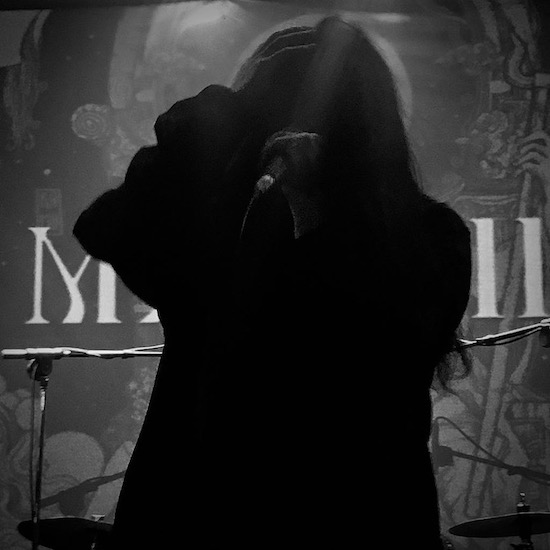
You have what can be called heavy bass in your speaking voice; vocally you’d be able to reach levels of depth in baritone that open possibilities for the future. Have you ever thought about writing and recording stuff that is sung cleanly?
While it is certainly possible for me to explore those artistic territories with my vocal qualities, I have yet to chart a specific path in that regard. Though were I to do it, it would be in the likes of guys like Peter Steele, Till Lindemann, or probably even Johnny Cash (haha).
The final song on Reflection of a Wretched Soul seems to me to be the heaviest, and your tastes as I’ve gleaned from conversations over the years can be described as eclectic. How were you able to take depressive black metal, raise it into Polish black territory a la Mgła, and then so smoothly transition into territories of what – for the lack of a better word – can only be described as the anti-breakdown?
It all traces back to a long and conscious process of accumulating knowledge, processing them to form my own understanding of the input materials, and producing something of my own based on what I have learned.
I have long been feeding myself with a massive assortment of music, from conventional DSBM, to other subgenres of black metal as well as that of death-, doom-, and even non-metal music like cinematic scores and jazz. From there I would dissect the music into elements that I can then draw inspiration from for my own material. The end result is an album that is very evidently a DSBM album, but there is also the touch of my background knowledge and personal identity.
The piano coda accoutered with whispers and symphonic elements in the closer are just chef’s kiss for me. How did you get those elements recorded and was the mixing, mastering and recording process (which you did all by yourself) a laborious or enriching one (apologies if this seems like a repeat question)?
Similar to the whole of the writing and recording process, it was straightforward as well [Edit: hell haha]: I come up with the melody, then run it through my keyboard, et voilà!
Who/which entity has been your biggest influence for writing words, composition, feel?
I cannot say there is one entity that stands predominant in my list of artistic inspiration, bar the consistent sentiments of misanthropy and nihilism, but the surrounding themes have always been changing, evolving, and (in a twisted sense) harmonizing: philosophy, spirituality, and mythology are a few among them.
Three words to ruminate on: catharsis, katabasis, ill-grace; go!
Catharsis: An overwhelming monster of emotion that sweeps one from their feet and carries them away, the destination can either be serenity or catatonia. Ultimately a mortal affliction, still.
Katabasis: The end of a long stupor by journeying into the beginning of yet another. Eternal recurrence. Naught to be feared. Naught to be thrilled.
Ill-grace: The fateful poison that taints and mars all that is altruistic and pure. Also known as “the human element”.
What is in the offing for Dødssanger other than the physical release of your album coming soon? [Edit: it has been released as of this writing; links can be found below]
No definitive plans for now, but do know that I am always in the process of creating.
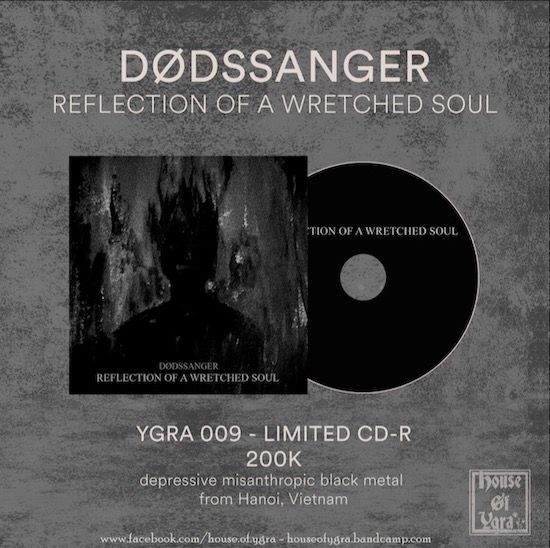
Thanks for your patience and candor in this. Peace and Hails!
The pleasure has been all mine. And now, as this occasion of interrogative discourse enters its eventide, I shall bid my adieu and return to solitude, awaiting the next opportunity to either lull humanly congregations into their undoing or numb their minds with yet another onset of garrulous verbiage.
Links:
https://dodssanger.bandcamp.com/album/reflection-of-a-wretched-soul
https://houseofygra.bandcamp.com/merch
https://www.facebook.com/dodssanger.bm
https://open.spotify.com/artist/5qLltuPijAC3BfQEOIXUSI
https://music.apple.com/il/artist/d%C3%B8dssanger/1684133128
https://listen.tidal.com/artist/38980932
https://www.deezer.com/us/artist/211006707

Very interesting interview from an almost unknown metal scene. You mentioned a festival in Cambodia where all the bands shared members–this is common in other countries in Asia too. I guess it reveals just how small the scene is in these places.
I hope you continue these interviews with Asian metal bands. Although the scene is small pretty much everywhere, there are quite a few bands that have been around a surprisingly long time, and probably have lots to share. It would be especially interesting to hear from Malaysia, where the gov does shut down shows and censor concerts. Yet I get the impression that Malaysia has a reletively large and robust scene. It would then be cool to juxtapose that with Thailand, for example, where there is no censorship of metal at all, yet the scene remains tiny.